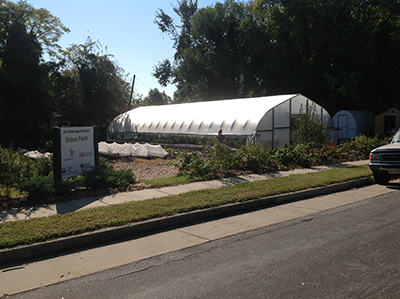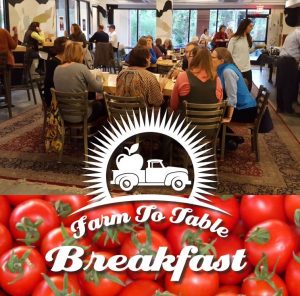
The 31st Baptist Church Urban Farm Is supported by Virginia Cooperative Extension, USDA, Bon Secours, and Tricycle Gardens. A high tunnel greenhouse was recently installed in the community garden via the National Resources Conservation Service cost-share program. Photo provided by Dr. Morris Henderson.
By Joyce Latimer, Professor of Horticulture at Virginia Tech
The Virginia Cooperative Extension Community, Local, and Regional Food Systems Forum opened with a powerful success story of communication and cooperation between Brittany Council and Twandra Lomax-Brown of Virginia Cooperative Extension in Richmond City and the community told by Dr. Morris Henderson, pastor of the 31st Street Baptist Church in Richmond.
Dr. Henderson and his church have been feeding the hungry and homeless in their community since 1990 when the local soup kitchen closed. In 2009, Dr. Henderson had a great vision to use his church property, and members and volunteers to create a community garden that would help feed the citizens of Richmond and contribute to the eradication of food deserts in the city. The church founded the Darrel Rollins Memorial Community Garden in honor of a previous pastor at the church.
Dr. Henderson had church members with gardening experience, but he needed the depth and breadth of knowledge, technical assistance, and networking that VCE could provide to expand this community garden into a fully functional urban farm that could help address the food desert issue. Dr. Henderson approached Extension agents Council and Lomax-Brown for assistance. They connected him with Amber Morgan, 4-H youth development agent, and Joe Logan, youth family nutrition program associate, who provided individuals with information about youth programs and basic education on the selection, use, and nutrition of fresh produce. In addition, local Extension Master Gardeners provided basic educational resources such as soil sample kits and growing guidance and assistance, and worked with the Mayor’s Conservation Corps Youth summer interns to begin the actual work of forming of the community garden on the church property.
Continue reading>>
 Think of Norfolk, Virginia and you think of a lot of things – unrelated to nutrition problems. It’s home to the world’s largest naval station. Norfolk is military. Located in the heart of Hampton Roads, Norfolk is one of the most important shipping hubs in the world. Norfolk is blue-collar. Norfolk is as urban as it gets in America.
Think of Norfolk, Virginia and you think of a lot of things – unrelated to nutrition problems. It’s home to the world’s largest naval station. Norfolk is military. Located in the heart of Hampton Roads, Norfolk is one of the most important shipping hubs in the world. Norfolk is blue-collar. Norfolk is as urban as it gets in America.



